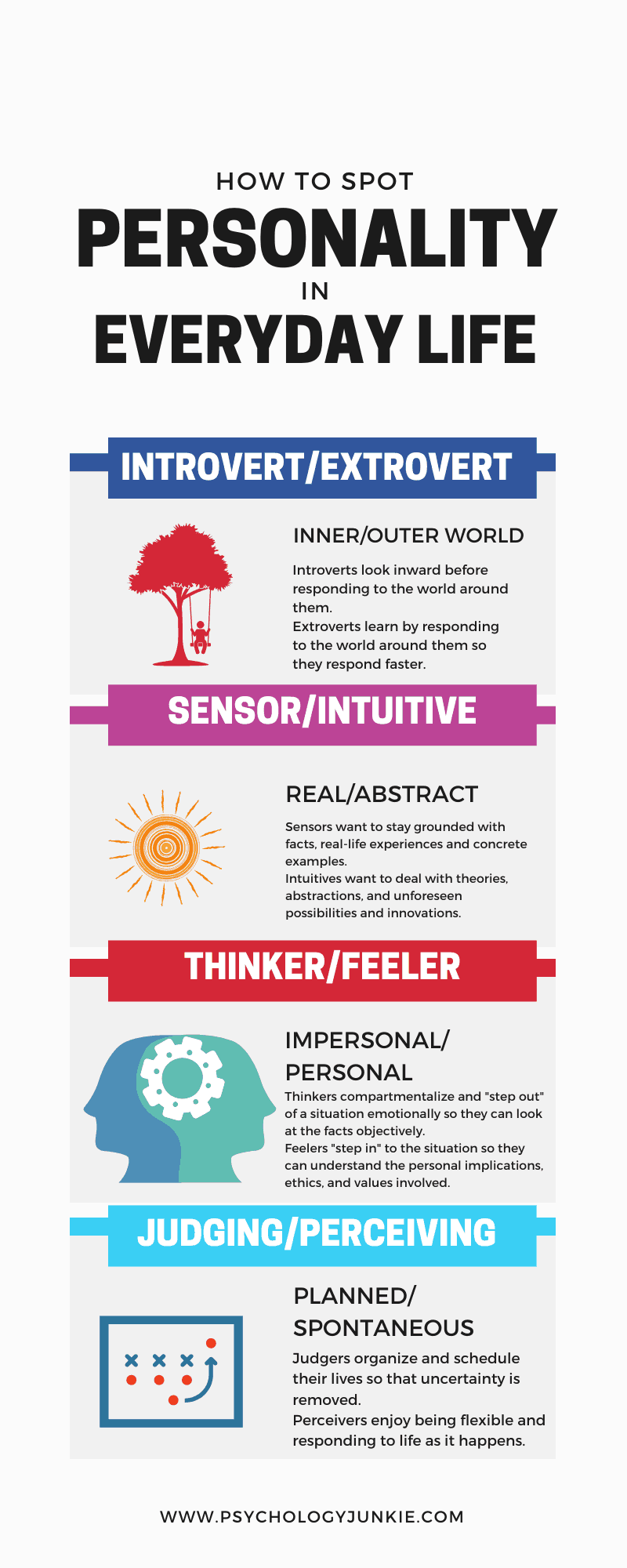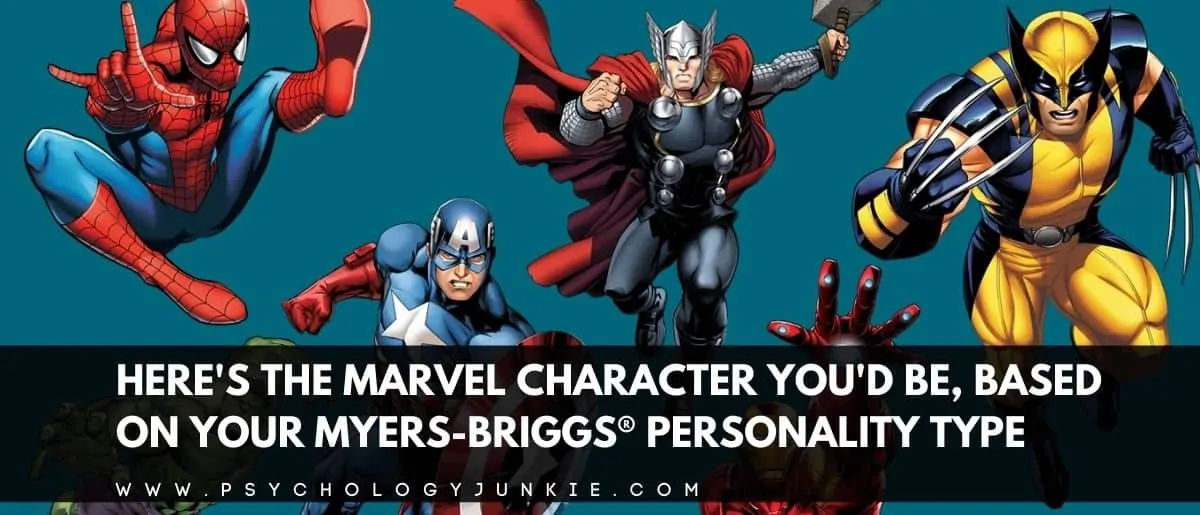Not Sure What Their Myers-Briggs® Personality Type Is? Look for These Clues!
On any given day you’re bound to meet new people from many different walks of life. Whether you’re at the office and you’re training a new employee or attending a church service and saying hello to a guest – nearly every day brings new individuals into your personal reach. If you’re a big fan of personality psychology you might find yourself trying to decode the types of the people around you. This can be a frustrating experience sometimes – the MBTI® isn’t always affordable, and free online tests are notoriously inaccurate. What are some simple ways that you can get better at deciphering someone’s type? Let’s take a look!
Not sure what your personality type is? Take our new personality questionnaire!

How to Find Someone’s Personality Type
Keep in Mind: Everyone will demonstrate an aptitude for all the preferences (I/E, S/N, T/F, J/P) at different times in their lives. There will be times when intuitives talk about sensing-related subjects and vice versa. Sometimes feelers can make very logical, no-nonsense decisions and sometimes thinkers can be empathetic and warm-natured. But consistency is what you’re looking for here. What is the FIRST preference of the person you’re dealing with? What is their most frequent mode of communication? Feelers can be logical – but they’ll typically look at the personal ramifications of a decision first (how will people be affected?). Thinkers can be empathetic – but they’ll typically look at the pros and cons and logical implications first. Keep in mind that you will see glimpses of every preference in every individual at different times in their lives, but when you’re typing them you’re looking towards their most natural and consistent tendencies.
Also, remember that typing someone on your own can be confusing and sketchy. Nobody knows someone better than a person knows themselves so remember that their outward appearance may be only one part of a much larger picture.
Communication and Personality Preferences
Extroversion or Introversion – E/I
Does the person you’re speaking with talk quickly, respond quickly, and appear to “think out loud?” If so, chances are they’re an extravert. Extraverts will usually respond faster to questions than introverts will and they seem energized by conversation and interaction with the world around them. If they show signs of extraversion, the first letter in their type code will be E.
Does the person you’re speaking with pause frequently when speaking? Do they seem to be assessing something in their mind before they say it out loud? If so, there’s a good chance that they’re an introvert. Introverts are usually slower to respond and process things internally before saying them out loud. If they show consistent signs of introversion, the first letter in their type code will be I.
Sensing or Intuition – S/N
Does this person explain things in a linear, step-by-step way? Are their questions composed of “what” and “how?” Do they seem realistic and focused on the practical realities of daily life? If so, they are showing signs of a sensing preference. Sensors are concerned with how things can be used, what actually happened, and the facts of life. They tend to use precise descriptions and explain things in more specific detail than intuitives do. If they show consistent signs of a sensing preference, the second letter in their type code will be S.
In conversation, does this person focus more on “why” questions? Do they skip over details as they try to get to the main point of the conversation? Do they seem more roundabout in their storytelling? Do all of their conversations seem to focus on possibilities, theories, and “what if” questions? If so, then they are showing signs of an intuitive preference. If they show consistent signs of an intuitive preference, the second letter in their type code will be N.
Thinking or Feeling – T/F
When it comes to decisions, does this person seem to be checking for logic? “If this, then that,” “What are the pros and cons?” “Let’s look at the facts.” Do they seem to be weighing objective evidence before they decide? At times does it seem like they’re testing your knowledge and expertise? If so, then there’s a good chance that they are a thinking personality type. Just remember that thinkers might move on from logical analysis to checking the ethical and personal implications of a decision. If they show consistent signs of a thinking preference, the third letter in their type code will be T.
In decisions does this person seem to be assessing the emotional impacts on other people? Do they seem concerned with how people will be personally affected and the moral implications? “How will this person feel?” “What do they think?” “What feels right to me or you?” If they seem to be assessing their values and the emotional impacts of a decision before logic then there’s a good chance they have a feeling preference. Just remember that feelers might move on from the ethical/value analysis to logical analysis. If they show consistent signs of a feeling preference, the third letter in their type code will be F.
Judging or Perceiving – J/P
In their day-to-day lifestyle, does this person seem to always have a plan and order for their day? Do they get impatient with long, drawn-out decisions or people who procrastinate? Do they seem drawn towards finality in decisions? If so, then there’s a good chance they’re a judging personality type. Judgers are drawn towards closure and like to have things decided. If they show consistent signs of a judging preference, the fourth letter in their type code will be J.
In their daily life does this person seem to want “space” when making decisions? Do they enjoy exploring information more than deciding about that information – generating more alternatives rather than narrowing them down? Do they switch between a variety of topics quickly before one subject has been resolved? Do they tend to decide things at the last minute? If so, they show a preference for perceiving. Perceivers have a “P” as the fourth letter in their type code.
Interests and Personality Preferences
Introverts have more tolerance for low stimulation than extroverts do. They relish quiet time to themselves – and they don’t need a device, a TV show, or an activity to keep them busy. Their focus is on the inner world first –so being in a quiet room with “nothing to do” is pleasant for them. In these places their mind can wander, they can check in with themselves, analyze, imagine, and reflect.
Extroverts have more tolerance for high stimulation than introverts do. They relish activity, interaction, and engagement with their environment. Some extroverts like talking to a wide variety of people, some like to keep busy with hands-on activities, some like having the TV on while they check their phone and talk to someone in the next room. They pay attention to what’s going on around them and have a wide variety of interests. They tend to learn by doing.
Sensors enjoy projects that engage them with the real world and require attention to detail (crafting, cooking, gardening, building, playing cards, soapmaking, etc,.) They are typically more in-tune with their bodies than most intuitives. They might notice internal aches and pains, hunger, or thirst more quickly than intuitives do. They will notice concrete details more quickly than intuitives (what someone was wearing, the construction of an object or building, special effects in a film, etc,…). Sensors enjoy being grounded and practical and pride themselves on having “common-sense.”
Intuitives enjoy projects that engage them with abstract possibilities and theories. Reading or discussing philosophy, brainstorming future possibilities, looking for patterns and associations – these are all things that entice intuitives. For the intuitive, activities lose their meaning and fascination if they are done the same way over and over again. They need to add variations or invent new ways of doing things to feel valuable. They are less interested in “common-sense” and more interested in imagination and abstraction.
Thinkers have a higher tolerance for debate and critical analysis than feeling types typically do. They enjoy taking apart problems and finding logical solutions. When it comes to debate and decisions they emotionally “step out” and compartmentalize the situation so that they can focus on the objective facts. They tend to show they care by solving problems for people.
Feelers pay attention to the emotional wavelengths that surround them. They pay attention to what is valuable or worthwhile to them and others – what they like, what’s important, what you like, what is important to you. They enjoy empathizing, sympathizing, problem-solving personal/emotional issues, and discussing topics that relate to their values.
Judgers like planning, scheduling, and organizing their environment so that their goals are achieved. They get a thrill from finishing a project and having a systematic plan in place for all their obligations. They buy planners and start their projects early so they don’t have to worry about looming deadlines. “An ounce of prevention is worth a pound of cure” is probably a relatable slogan for them. They hate uncertainty and they get rid of it by creating schedules and making decisions.
Perceivers are excited by surprises, exploration, and spontaneity. They are more stimulated by starting a project than they are by finishing it. They also like multi-tasking and switching between varieties of tasks. When they work on a project they tend to have an adaptable, exploratory approach – they enjoy learning as they go and don’t mind an interesting interruption. They tend to mix work with play and get bored when they have to focus for prolonged periods on one subject.
What are Your Thoughts?
Is this article helpful or do you have any other suggestions? Let us know in the comments!
Find out more about your personality type in our eBook, Discovering You: Unlocking the Power of Personality Type.
Some Other Reading You Might Enjoy:
Here’s What Makes You Dangerous, Based on Your Personality Type
How Other People See You, Based on Your Personality Type
What Each Myers-Briggs® Personality Type Needs in a Career
What Each Myers-Briggs® Personality Type Needs in a Relationship


















this is quite helpful for me, i get addicted to mbti to the point i have guess whats the personality type of those people around me or even strangers. Thankyou so much psychologyjunkie! <33
spellcheck would help you
You know this is garbage typology right? Mbti isn’t stable across periods as little as six months and isn’t correlated strongly with anything real.
I do get these comments regularly, so they’re not new. However, most people aren’t aware that there have been hundreds of validity and reliability tests conducted for the MBTI® assessments and I’ve spoken with dozens of psychologists who use it in their practices. Poorly understood personality theory doesn’t do much good – but in-depth knowledge of MBTI®, particularly the cognitive functions, is very helpful. You can see more information here: https://www.myersbriggs.org/my-mbti-personality-type/mbti-basics/reliability-and-validity.htm
I never organize my time but my project is perfectly structured in the temporal world… That’s what happens when I’m totally autonomous.
So it’s J or P? An enigma according your description.
The INTJ is the most independent of all types. The only logical reason for this is that he does not want to be constrained by others and time. When I realize a project I do not have an agenda for my creation. My creation is a agenda. You understand the difference? Because intuition-creation is not controlled. This is not a excel table…
So the J description is relatively wrong for the INTJ. For the rest, priority to the conclusion, the finalization, control of the “tree mind”, I agree.